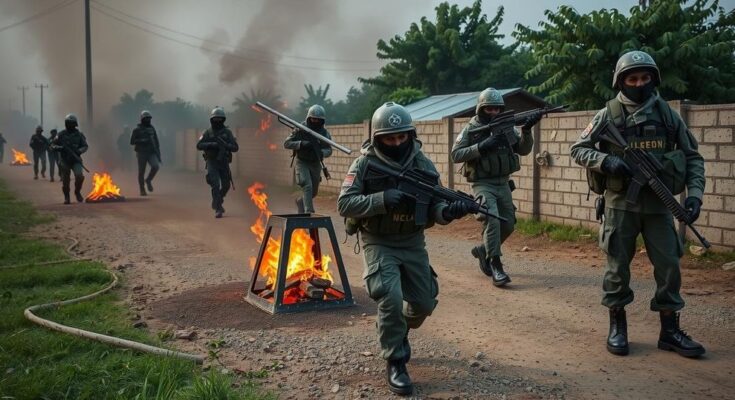The M23 conflict in eastern DRC has escalated, with the rebel group asserting its fight is a defensive war for Congolese Tutsis facing discrimination. The DRC government views M23 as a serious threat, and international allegations of Rwandan support complicate peace efforts. Dialogue remains stalled, and both sides continue to engage in military confrontations, exacerbating the humanitarian crisis in the region.
The M23 rebel group has intensified its conflict in the eastern Democratic Republic of Congo (DRC), which they describe as an “existential war” aimed at defending Congolese Tutsis from ongoing discrimination. Bertrand Bisimwa, the head of the group’s political wing, claims that the Tutsi community has been marginalized due to its ethnic ties to Rwanda. Armed confrontations between the DRC military and M23 have escalated over the past three years, leading to substantial loss of life and the displacement of approximately two million individuals.
Initially formed in 2012, M23 regrouped and resumed hostilities in 2022 after facing earlier setbacks. They have since gained substantial control over territories within North Kivu, justifying their actions as necessary for the protection of minority ethnic groups. “We are waging a defensive war to protect these citizens… They are not second-class citizens. The state must take care of them,” Bisimwa stated during an interview with Al Jazeera.
The Congolese government considers M23 a primary security threat, amid allegations from international observers, including the United Nations, suggesting that Rwanda is providing military support to the rebels—a claim that the Rwandan government denies. Attempts to broker peace through initiatives like the Nairobi process and Angola-led negotiations have proven largely ineffective. Following their advance into Lubero in December 2024, M23 has continued to face criticism for territorial expansion. Bisimwa contended that they are merely reacting to assaults from government forces, asserting, “We cannot be blamed for defending ourselves.”
In response to concerns raised by the UN about their territorial control, Bisimwa reiterated the group’s commitment to safeguard their region and mitigate violence. He pointed out that M23’s presence has facilitated the return of over 480,000 displaced individuals to their homes in areas controlled by the group. Despite the challenging dynamics, dialogue remains a contentious issue; the DRC administration has resolutely refused to negotiate with M23, perceiving it as a puppet of Rwanda. Bisimwa criticized this refusal, maintaining that “war cannot solve our problems. Dialogue alone can address the root causes of the conflict.”
Additionally, M23 faces allegations of alliances with groups like the Allied Democratic Forces (ADF) and of exploiting local mineral resources. Bisimwa refutes these claims and emphasizes that M23’s agenda is primarily focused on governance and community welfare. He notably remarked on the organization’s conservation efforts in Virunga National Park, striving to protect wildlife and curb illegal activities. Amidst ongoing strife, M23 remains steadfast in its desire for a peaceful resolution, urging Kinshasa to permit them to pursue autonomy in addressing their grievances: “If Kinshasa cannot solve our problems, it should let us solve them ourselves.”
The ongoing conflict involving the M23 rebel group in the eastern DRC has roots in ethnic tensions, historical discrimination, and regional dynamics involving neighboring countries. The DRC’s political landscape and security policy are significantly influenced by these factors. The M23 emerged from a mutiny in the Congolese army and is largely composed of Congolese Tutsis, who assert their fight is for self-defense against perceived injustices. International interests and allegations of foreign influence add layers of complexity to the conflict, contributing to an environment marked by instability and humanitarian crises.
In summary, the M23 group is firmly entrenched in an intensified conflict in eastern DRC, claiming to protect the rights of Congolese Tutsis amid accusations of external support and territorial aggression. The refusal of the DRC government to engage in dialogue, alongside sustained military actions from both sides, escalates an already volatile situation. With humanitarian implications at stake, the need for a negotiated settlement remains critical, as both parties grapple with the consequences of continued hostilities.
Original Source: eastleighvoice.co.ke




